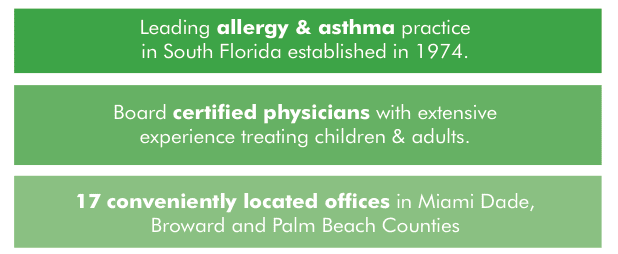
Summer vacation is a long deserved break to celebrate the fruits of hard labor and restore your energy, but also a more hectic time for parents of children suffering from allergies or asthma. With summer camps, barbecues and general travel plans come more preparation and organization to prevent unpleasant episodes.
First things first: schedule a full checkup with the allergist before you begin your vacations, get updated prescriptions, make sure you have non-expired medications, ask for a copy of any allergy or asthma action plan.
Fireworks, bonfires and s’mores are everyone’s dream for Independence Day; however, these can cause asthma symptoms to flare up due to the metallic particles and polluting gases produced by the explosions. If you really cannot avoid participating, keep your distance, sit upwind, wear a mask to keep smoke out of your lungs, and be ready with your inhaler and prescribed medications.
SPF and insect repellent. Outdoor summer camps are a child’s dream and a parent’s worst headache. Let’s be honest, climbing a tree or playing volleyball is a lot more fun than staying behind to spray the lotion or carry the insect repellent to re-apply in between games. It requires discipline for sure, but it will avoid allergic reactions. Be equipped with ice packs and oral antihistamines; in case of severe allergic reaction seek immediate medical care.
Bedbugs can be found in numerous locations, including airplane seats, hotels, rental homes and boat cabins together with dust mites and molds in carpeting, mattresses and and upholstered furniture. They can even make their way into luggage. Bedbug bites appear as red bumps on areas of the skin that is usually not covered while sleeping. For individuals with allergies, this can become a severe problem. Seeking medical assistance and taking precautions is essential. It is recommended to sleep in long-sleeved shirts and pants, minimizing exposure. An allergy specialist will help determine the exact cause and course of treatment, including antihistamines and corticosteroid creams.
Food allergies: 3 to 5 percent of children have a food allergy. The most common aller- gy foods include milk, wheat, egg, peanut, tree nuts, soy, fish and shellfish. If your child is allergic, safety measures must be put in place. When planning to register to a summer camp, the facility administrators and counselors should be aware of the specific foods the child is allergic to and the life-threatening condition.
- Fill in camp’s medical forms and provide the Food Action Plan. Include medical documentation and written instructions.
- Provide medications prescribed by allergist: sealed and not expired.
- Train and explain how to administer epinephrine to camp staff, considering that the environment of the camp is new and the routine is different than in school
- Avoid at all costs the offending foods and any unknown ones.
- Never TRADE foods.
- Your child should be trained on how to use epinephrine and should alert if any early symptoms should arise.

To schedule an appointment call 1-877-4-ALLERGY or visit florida-allergy.com





